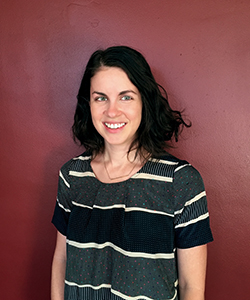
Lives of Consequence
Ashley Varrato '05

Coordinator of Teacher Growth and Evaluation, Pittsburgh Public Schools
In the Pittsburgh Public Schools (PPS), a district that serves about 25,000 students each year, Ashley Varrato ’05 is helping define what effective education looks like as she manages and supports teachers and principals.
In her role as Coordinator of Teacher Growth and Evaluation for PPS, she implements the Research-based Inclusive System of Evaluation (RISE), the District’s system for observing teachers, ensuring that the teacher evaluation process remains consistent and effective across the district’s 57 schools.
“I love visiting classrooms and getting to know the principals, teachers, and students in our district, and using their feedback to make our observation system stronger,” says Varrato, who engages “with principals to help them collect good notes during an observation and translate those notes into actionable feedback that a teacher can then use to make adjustments to his or her teaching. My role allows me to be in our schools and classrooms often, working with and learning from the teachers and principals who are experiencing classroom observation.”
As the Pittsburgh schools seek to accelerate student achievement and eliminate racial disparities -- two of the District’s main objectives -- Varrato acknowledges that “there are lots of factors that contribute to meeting these goals, but we believe teachers are the most important school-based factor, which led us to focus efforts on “ensuring that all students have an effective teacher in their classroom.”
A sociology and public policy double-major, Varrato says she had a “true liberal arts experience” at the Colleges. “I wasn’t originally interested in education, but was interested in non-profits that supported children,” she recalls. “Because of the emphasis on experience-based learning, I had the opportunity to work with two Geneva organizations during my time as an undergraduate, both serving local children.”
When she returned to her hometown of Pittsburgh, she wanted to work with non-profit organizations with a similar focus on education, and in 2011, she joined PPS to support new policy work they were undertaking.
RISE developed from teacher feedback collected in 2008, which indicated dissatisfaction with the current evaluation system “because that system essentially treated all teachers the same, regardless of performance in the classroom,” says Varrato, who in the years since has been a Strategic Data Project Fellow at Harvard University.
With the support of two large grants, she and her colleagues collaborated with teachers and the teachers’ union “to develop a system that combines teachers’ daily practice in the classroom, contributions to student growth, and student feedback to give a multi-faceted perspective on a teacher’s practice.”
“For too long, teachers had gone unrecognized for their individual strengths and contributions to student learning,” Varrato continues. “School districts have been unable to measure differences in teacher effectiveness or use this information to help teachers improve. We now have ways to understand and respond to differences in teacher effectiveness, and change the experience our students have in classrooms every day.”
In the RISE system, professional growth opportunities can be refocused at both the individual and district level; principals can be strategic when placing teachers to maximize their strengths; faculty and administrators can drive district-wide efforts in recruitment, promotion, recognition, retention, and compensation.
For Varrato, each of these factors means there’s more potential to impact students in Pittsburgh, and maybe beyond.
“I believe that each child deserves a high-quality education, and that it's our obligation as a district to try to provide that,” she says. “By improving the type and quality of feedback our teachers receive, our hope is that we can impact the experience their students are having each day. The ambitious goal beyond that is that what we learn here in Pittsburgh can help inform the work other districts are doing across the country.”
